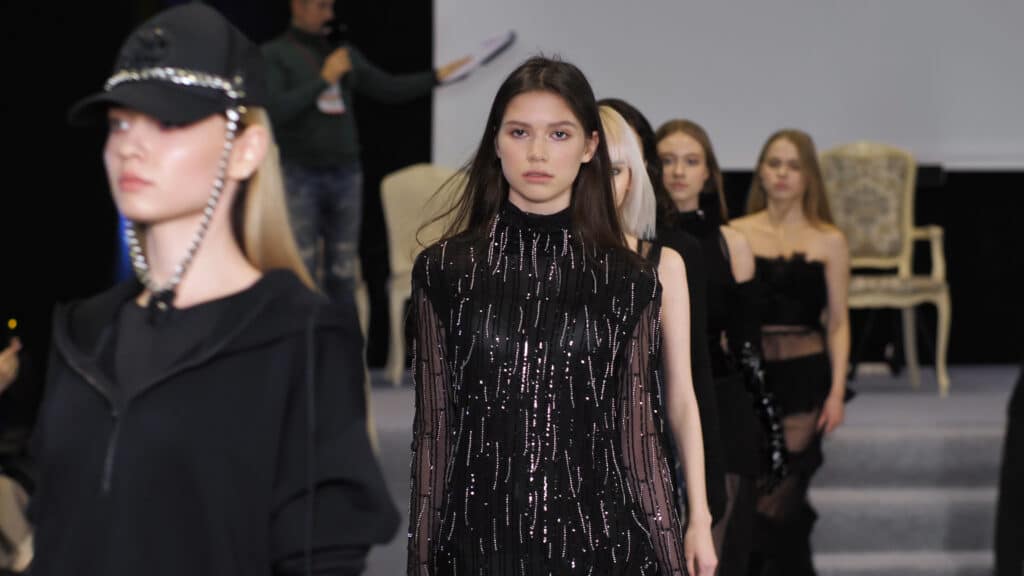Fashion is a way of expressing our personality through the clothes we wear. Different people wear different styles and not everybody likes to follow the current fashion. Some people are old-fashioned and like to wear their good old clothes and buy new clothes only when it’s absolutely necessary. Others, especially women, like to follow the latest trends and buy more clothes than they really need. Quantity is more important for them than quality and they often buy fast fashion items. Fast fashion is inexpensive and usually low-quality clothing and footwear that is mass-produced with cheap labour and that’s why buying and wearing them raises ethical questions. Though it’s easily affordable for people, those who sew and produce them in the countries of their origin live in poverty and can hardly make ends meet even if they work very hard.

Most people cannot afford to buy designer clothes, as they are very expensive. Only the very rich have money to buy real designer items because they cost a fortune and are affordable for very few people. They are a symbol of status and wealth to show off with.
Peer pressure is another aspect of fashion trends. It starts as early as kindergarten where the kids must have the clothes their peers wear with all the trendy cartoon characters on. In the primary and secondary school age group wearing trendy clothes and accessories is important. Kids who cannot afford to buy and wear them are sometimes ostracized and made fun of.
Fashion is as diverse as people are. Even if something is trendy it’s not sure that it looks good on you. Everyone has to find their own fitting style in clothes and wear what they feel comfortable in. Some girls like to wear dresses and girly fashion and some girls wear only trousers and T-shirts. Boys sometimes wear the same clothes over and over again and don’t want to buy new ones, but there are boys also who are fashion-conscious and spend big amounts of money on clothes.
Fashion and fashion styles have changed a lot over the centuries. In the past, women wore only dresses and skirts. Over time the length of dresses and skirts became shorter and shorter and these days it’s absolutely acceptable for females to wear trousers. Though it’s not true the other way around. It’s not common for men to wear a skirt, except for the Scottish national kilt. Not only the styles of clothes have changed over the centuries but some new materials that clothes are made of were also invented along with the development of the clothes industry. Clothes were sewn entirely by hand a long time ago, while nowadays mass production is the norm. Hand-made clothes were replaced by mass-made ones and fast fashion is readily available for people.
Real, luxurious designer clothes have astronomical prices. High-fashion clothes were and are designed by big names like Coco Chanel or Giorgio Armani. Designer clothes are often displayed in fashion shows on catwalks by beautiful young models. New York City, London, Milan, and Paris – called the Big Four – are the most prominent fashion capitals of the world.

Vocabulary
| current | aktuális, jelenlegi |
| old-fashioned | régimódi |
| to follow the latest trends | követni a legújabb divatot |
| quantity | mennyiség |
| quality | minőség |
| fast fashion | olcsó, divatos ruházat, „fast fashion” |
| inexpensive | olcsó |
| mass-produced | tömegtermeléssel gyártott |
| cheap labour | olcsó munkaerő |
| affordable | megengedhető, megfizethető |
| to sew | varrni |
| poverty | szegénység |
| hardly | alig |
| to make ends meet | megélni, kijönni a fizetéséből |
| cannot afford to | nem engedheti meg magának |
| to cost a fortune | egy vagyonba kerülni |
| wealth | gazdagság |
| to show off with sg | feltűnősködni valamivel |
| peer pressure | kortársaktól jövő nyomás |
| accessories | kiegészítők |
| to ostracize | kiközösíteni, kiutálni |
| diverse | különféle, változatos |
| fitting | hozzá illő, neki jól álló |
| girly | lányos |
| over and over again | újra és újra |
| fashion-conscious | aki odafigyel és követi a divatot |
| length | hossz |
| acceptable | elfogadható |
| the other way around | fordítva |
| kilt | skót (térdig érő férfi) szoknya |
| material | anyag |
| to invent | feltalálni |
| development | fejlődés |
| clothes industry | ruhaipar |
| mass production | tömegtermelés |
| astronomical prices | csillagászati árak |
| catwalk | kifutó (divatbemutatón) |
| prominent | kitűnő, kiváló |


